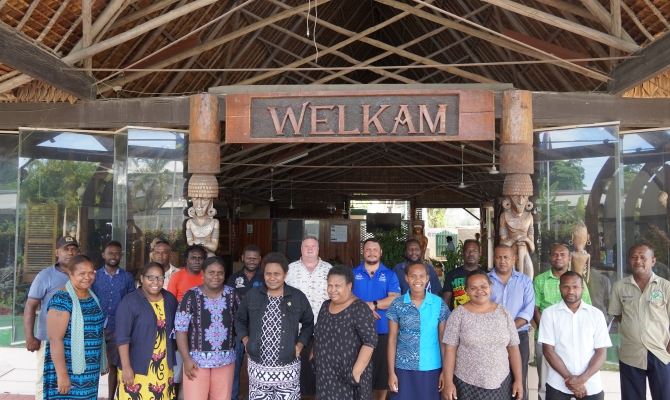
March 12, 2024 – The Secretariat of the Pacific Regional Environment Programme (SPREP) Pacific Regional Invasive Species Support Management Service (PRISMSS) is collaborating with the Solomon Islands Government and in particular the Barana community to make significant progress towards the management of invasive species in the Solomon Islands with a focus on restoring ecosystem resilience at the Barana Community Nature and Heritage Park.
Two stakeholder engagement workshops were recently conducted by the SPREP PRISMSS team, focusing on the PRISMSS War On Weeds (WOW) programme and the PRISMSS Resilient Ecosystems, Resilient Communities Programme (RERC). Over 40 participants, including representatives from communities, NGOs, and government organizations, attended these workshops.
Following the discussions, it was determined that a WOW programme, which targets high priority, low incidence weeds, was not a suitable solution due to the widespread distribution of the identified priority weeds. As a result, the focus shifted towards investigating the suitability of the priority weeds for a Natural Enemies, Natural Solutions (NENS) programme, for which there are many opportunities in the Solomon Islands and for which a programme will be initiated under the project.
The RERC site prioritization workshop identified eight priority sites for restoration including weed management and potential predator management. Among these, the Barana Community Nature and Heritage Park emerged as the leading site for piloting the programme in the Solomon Islands. The park, spanning approximately 5,000 hectares, is a cornerstone of community-based conservation efforts in the region and offers opportunities for the wider group of park rangers in the country to learn from.
A hands-on training session was recently completed at the Barana Community Nature and Heritage Park, demonstrating the management of weeds at the site that could be achieved with available resources. This training was met with enthusiasm by the Barana community, government representatives, and the Rangers Association in the Solomon Islands.
Key outcomes from the scoping activities include the identification of human resources, equipment, and community outputs for the Barana Community and the Department of Environment and Conservation. These findings will directly contribute to the planning and development of the activities to be implemented with the Solomon Islands Government to initiate the RERC program under the new PRISMSS-Restoring Island Resilience (PRISMSS-RIR) project funded by the New Zealand Government.
In addition, it was recognised that there is a need for a dedicated National Invasive Species Coordinator for the Solomon Islands as activities are stepped up. The coordinator will oversee PRISMSS activities within the country, collaborate closely with the Barana community to achieve project outputs for the Barana restoration site, and facilitate technical support from PRISMSS as necessary. Furthermore, the scoping identified the necessity for facilities to support the community's efforts in managing invasive species within the Barana restoration site.
Director of Environment, Mr Josef Hurutarau, expressed the Government of Solomon Islands' enthusiasm for collaborating with SPREP and PRISMSS to address the pervasive issue of invasive species in the country.
“Over the years, Solomon Islands has flagged invasive species management as a major gap in-country through the Pacific Invasives Species Indicators Survey, with the lack of staff capability in the technical skills required. With this opportunity offered to us, the Government of Solomon Islands is delighted to work with SPREP and PRISMSS to address the issue of invasive species, which has been a major problem for years now in Solomon Islands. We look forward to continue this work under future projects wherever possible”.
Jerry Mane, Coordinator of Barana Community Park and Heritage Park, emphasized the critical role of invasive species management in preserving ecosystem services and enhancing community livelihoods. He highlighted the benefits of the training provided by PRISMSS in safeguarding the park's biodiversity and enhancing food security.
“Invasive weeds and pests have posed many threats to Barana Park’s land and ecosystem services. These have been major constraints to the effective management of the site, and there has never been a right time for this intervention by PRISMSS to address this issue in our community. With the training provided to remove some of the prevalent weeds from our forests, this will provide a lot of benefits to our people in terms of enhancing our food security, and protecting ecosystem services such as water supply, soil stability, and pollination for Barana”.
The launch of the PRISMSS-RIR project will increase the geographical coverage of the PRISMSS programmes such as WOW and RERC by increasing support to Melanesian and Micronesian countries.
“A lot of the technical support and effort provided under the PRISMSS War on Weeds and Resilient Ecosystems-Resilient Communities Programmes since 2019 have been focused largely on the Polynesian region, “said SPREP Invasive Species Adviser, David Moverley. “This has been largely due to the funds available to us. With the funding support provided by the New Zealand Government, we can now expand the scope of our work to Melanesian countries like Solomon Islands and Vanuatu, and Micronesian countries like Palau and the Federated States of Micronesia”.
Moving forward, PRISMSS aims to develop and pave the way for project activities to commence in July 2024.